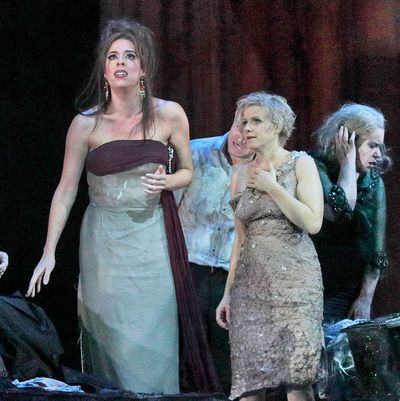
A few sheep are already grazing onstage at the Metropolitan Opera as the audience files in. Soon, a flock of human characters enters the set, having attended another opera in another city. Dressed in white tie and floor-length satin, they are gathering in a private mansion, a wonderland of crystal and silver. Their host calls for the footman to take their coats, but he has vanished in an inexplicable panic. Dressed in white tie and floor-length satin, a dozen characters gather for dinner after the opera. Their host calls for the footman to take their coats, but he has vanished in an inexplicable panic. Those last two sentences are not an editing error: Thomas Adès’s intricate yet hyperdramatic new opera, The Exterminating Angel, like the Luis Buñuel movie on which it’s based, loops back on itself in unsettling déjà vus.
Adès must have been moving toward this work his entire life. Buñuel’s 1962 film about socialites trapped in a never-ending dinner party resurrected the surrealism of the 1920s and anticipated the psychedelia of the ’60s. Adès — whose mother, Dawn Adès, is a noted scholar of surrealist art — circles back around to that familiar weirdness. (He was not yet 30 when the musicologist Richard Taruskin referred to him as a surrealist composer.) I suspect that what attracted him to Buñuel’s film was its complete lack of music and the extravagant variety of human extremes that he wanted to score. A woman dreams that she’s being pursued by a severed hand. An elderly lech takes advantage of the sleeping arrangements to try a little rape. A bear makes a surprise appearance. Adès somehow comes up with the perfect accompaniment for it all. His imagination is so prolific, his command so total, that I often wish he would pause and let a passage spin out before cutting it off and deciding it’s time for something completely different. A bit of belle époque revelry out of Rosenkavalier, a terrifying snare drum crescendo that sounds like Bolero’s evil twin, a high-flying mariachi trumpet, a bewitching love-death sung by a naked couple tucked in a closet — each of these flashes might have birthed a whole other opera.
Adès, now 46, came of age as a fin de siècle composer, and there was always something deliciously decadent about the way he assembled everything he had ever heard into an overstuffed cornucopia. And so it’s natural that he should usher those posh dinner guests into his world, then seal them in with an unseen force, and fiddle as they burn the furniture, smash the pipes for water, and descend into savagery and self-pity. The situation in the film can represent whatever you choose: the Franco dictatorship (which Buñuel fled), fascist regimes in general, genteel hypocrisy, the bubble of the entitled few. Tom Cairns, who adapted the film script into a libretto and directed the production, both with immense finesse, doesn’t offer any more specific interpretations. But Adès’s score adds a new layer of meaning: It demonstrates that music of exquisite craftsmanship can touch all that is most primal in us. I can’t think of another living composer who can conjure fear, contentment, bitterness, disgust, and joy with a few quick measures, almost as if he were touching labeled keys. To watch him in the pit, expertly conducting his own runaway creation, is to sense how deeply he relishes both chaos and control.
He is funny, too. When, after days of captivity, the group manages to catch an errant lamb and roast it over a bonfire made from a splintered cello, one young man complains ironically that the meat is too pink and that he prefers it à point. The composer mocks him with the whine of a muted trumpet. In another scene, that same petulant youth, sung by the superb countertenor Iestyn Davies, launches into a bravura complaint about missing coffee spoons. Frivolous sentiment rubs against serious music to create a rapturous friction.
Surrealism is a deadpan style, and in the film, most of the actors keep their delivery straightforward and subdued. Adès’s characters, on the other hand, hoot and snarl. Audrey Luna sings the role of the diva Leticia, her high-altitude flights spinning off into the atmosphere even as John Tomlinson, as the eminently rational Doctor, tries to keep his companions tethered to earth with his unfrayable bass. (The Doctor is, depending on your point of view, a heroic champion of decency or a deluded old man calling hopelessly for good manners while society reverts to the bestial.)
Even conventional opera has a touch of the surreal, and Adès milks the innate strangeness of putting life to music. When the dinner-party prisoners, still dressed in their stained tailcoats and rumpled gowns, finally stroll through the invisible wall as if it had never been there at all, he doles out jubilation with a coffee spoon. Distant chants mix with church bells, and the effect lies somewhere between the festive and the funereal. Crowds come running, mobbing the smelly escapees. As the chiming gets louder and the snare drum sneaks back in, the throngs find they can no longer exit into the wings. Instead, they press together into the stage within a stage, while in the auditorium, the power of the music pins thousands of operagoers to their upholstered seats.
On opening night, after the enchantment and discomfort had finally lifted and the audience dispersed into the night, I found myself in the center of a packed subway car, mashed between strangers, unable to move. As the moving train seemed to take up Adès’s relentless drumbeats and the eerie howl of the ondes martenot, I half expected the throng to part and a flock of sheep to saunter down the aisle.
The Exterminating Angel is at the Metropolitan Opera through November 21.


